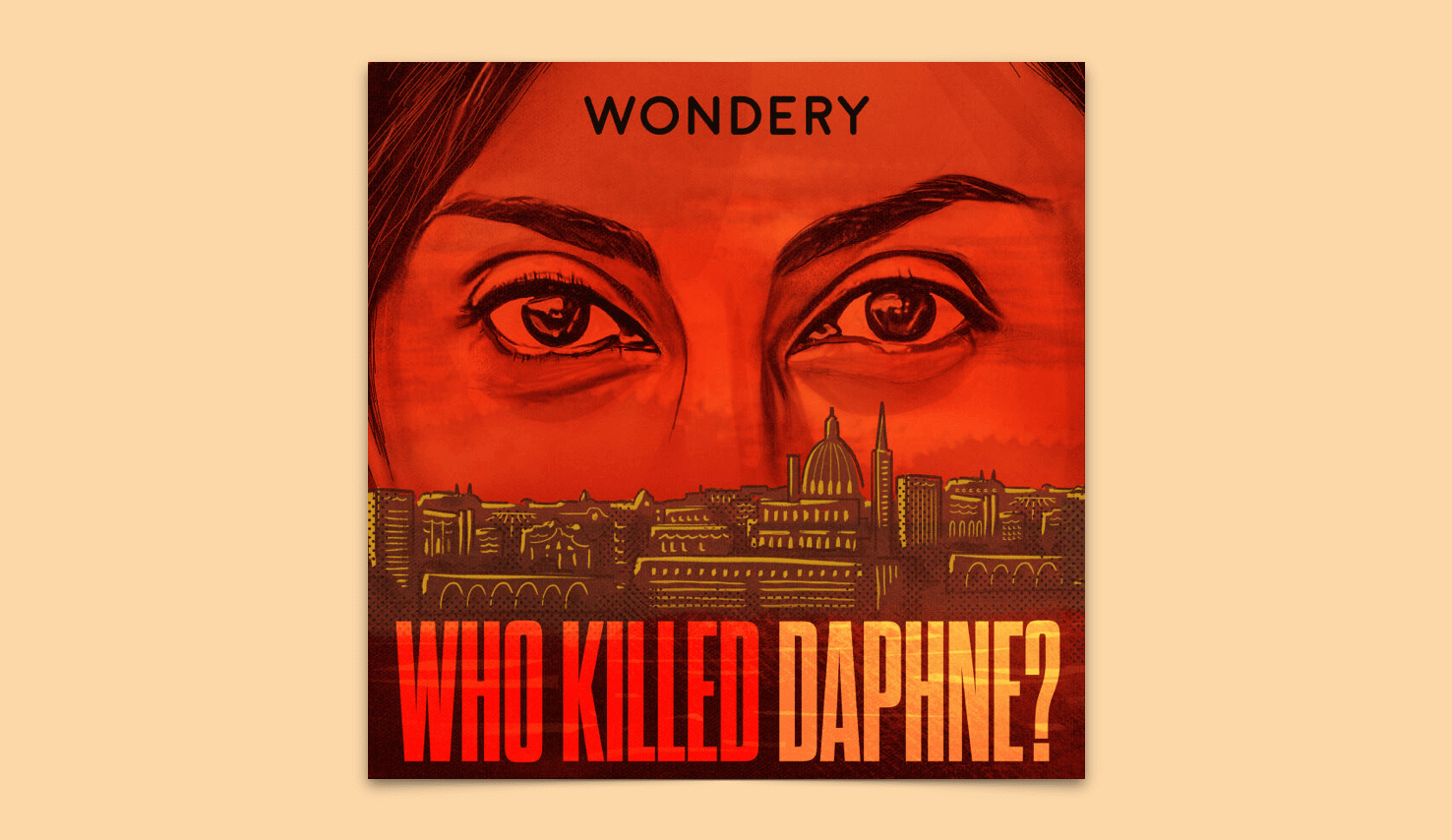Who Killed Daphne?, the latest chart-topping podcast from Wondery, investigates the 2017 murder of leading Maltese journalist Daphne Caruana Galizia, who was killed by a car bomb that ripped apart her Peugeot with such force that debris was thrown into a nearby field.
The backdrop of this story is The Panama Papers, the massive 2016 leak of 11.5 million files implicating the international ultra-rich and government leaders from twelve nations in hiding money in offshore entities. For Caruana Galizia, whose work was focused on holding the powerful to account, the information in the Papers offered to expose a nexus of bribes and corruption at Malta’s highest levels. She got to work publishing her findings on her blog, leading Politico to describe her as “a one-woman WikiLeaks.”
After learning of Caruana Galizia’s shocking death, host and Reuters reporter Stephen Grey writes “Who killed Daphne” on a sticky note and pastes it to his computer monitor. It’s a question he becomes determined to answer. At the time, Grey had recently worked on projects with Caruana Galizia’s son, Matthew, a data journalist. And just a month earlier, Grey’s personal friend, the Indian journalist Gauri Lankesh, was gunned down outside of her home in Bangalore. The similarity of two women murdered for speaking out is too much for him to ignore.
Together with a team of other saddened and outraged reporters, Grey forms The Daphne Project, an international consortium dedicated to completing Caruana Galizia’s work and surfacing who may have ordered her murder. Grey dedicates significant resources toward delving into a complex network of politics, illicit payments, and old grudges. Despite all of this intricacy, Who Killed Daphne? largely emerges as a classic follow-the-money story.
Want to receive our latest podcast reviews and episode recommendations via email? Sign up here for our weekly newsletter.
As a host, Grey is meticulous and artful in distilling years of reporting into a compact, six-episode podcast. The show is unafraid to get technical, taking time to untangle a web of offshore companies. It can feel nearly fictional, as when there is a yacht chase. And it’s certainly emotional. In the opening episode, Matthew Caruana Galizia describes coming upon the burning wreckage of his mother’s car. The damage is so extensive, he is only sure it’s her because he sees a smoldering Peugeot hubcap. The scene is heartbreaking.
Yet, Who Killed Daphne? is plagued by several odd editorial choices. For example, despite many well-executed interviews by Grey, we don’t hear Caruana Galizia’s own voice until episode three. For a woman who had so much to say, it comes across as a glaring omission to not include more of her audio, and sooner.
As well, when Grey speaks with Joseph Muscat, Malta’s then prime minister, Muscat goes on a long tangent about how Caruana Galizia wrote about him eating at a burger joint, which she saw as unbecoming. It’s understandable Muscat would be rankled by the pettiness. However, it is unclear why this is given airtime. It has the (presumably accidental) effect of undercutting Caruana Galizia’s credibility, which was never in question.
Then there’s the show’s jangly theme music and aggressive use of cliffhanger endings, which interfere with its narrative arc. There seems to be a trend of podcasts being produced more like serial television, which leaves Who Killed Daphne? with a genre problem. Is this a serious work of investigative reporting? Or another true crime production designed foremost to be scintillating? By the final episode, the format becomes tiring.
The persistence and care that Grey, Matthew Caruana Galizia, Maltese journalist Jacob Borg, and the entire team at The Daphne Project put into finding justice for Ms. Caruana Galizia is nothing short of heroic. They pore over the Panama Papers for clues to who may have ordered her murder. They refuse to let the story die, and the integrity of the reporting is undeniable.
Unfortunately, the podcast’s insistence on constant thrills do a disservice to these efforts. Despite the odd hamburger post, Daphne Caruana Galizia was not a journalist who was known for manufacturing drama. Rather, she was so committed to her craft, it got her killed.
¤
Wendy J. Fox is the author of the collection The Seven Stages of Anger and Other Stories, the novels The Pull of It and If the Ice Had Held, and the collection What If We Were Somewhere Else. Her work has appeared in The Rumpus, Buzzfeed, and Self, as well as in literary magazines including Washington Square, Euphony, and Painted Bride Quarterly.

